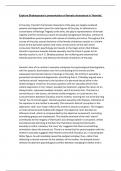Explore Shakespeare's presentation of female characters in 'Hamlet'.
In the play, 'Hamlet' the female characters of the play are largely rendered
passive and dependent upon the male figures of the play. In adherence to
conventions of Revenge Tragedy at the time, the play's representation of female
virginity and the monstrous nature of sexually transgressive females, coheres to
the Elizabethan preoccupation with values of chastity and virtue. Throughout the
course of the play, sexual deviance of the female characters results in a violent
shock to the domestic sphere and male constructions of the self, which
consumes Hamlet's psychology and results in the tragic action that follows.
Hamlet's repulsion towards female sexuality and the threat it poses to his
identity results in, as A. C. Bradley posited, the 'su ering and calamity that
extends past the hero' and destroys the female characters of the play.
Hamlet's fear of his mother's sexuality catalyses his psychological disintegration,
with her psychic domination over him contributing to his inertia and the
subsequent protracted nature of revenge in the play. His mother's sexuality is
presented as bestial and degenerate, something that A. C Bradley argued was a
'perfectly natural' response to the location of a perverse sexual drive in the
maternal figure. However, his preoccupation with her sexuality which finds
violent expression in her 'closet', possibly her bedroom, signals the return of an
idiosyncratic, repressed oedipal complex, which torments him. The bed is a
central focus in the scene, as Hamlet vividly imagines, in crude terms, the
consummation between Claudius and his mother, warning her not to let the king
'tempt' her to his bed again. Hamlet equates sexuality with disease, indicative of
his repulsion to his mother's sexuality. The semantic field of corruption in the
adjectives 'rank' and 'nasty' reflects his mother's sexual corruption. The imagery
is multi-sensorial and fuelled with disgust: the adjective 'rank' denotes an
o ensive smell, which is compounded by the adjective 'enseamed', connoting
something greasy and unpleasant. The double entendre of the verb 'stew'd'
contributes to the imagery of Gertrude's soul being soaked in corruption, whilst
simultaneously denoting a brothel; the implication being that Gertrude's
sexuality is sinful. Likewise, the noun 'sty' suggests that there is something
animalistic about the sexual act. There is a sense that his preoccupation with his
mother's sexuality suggests that Hamlet cannot kill Claudius as, in usurping the
father figure, he will inevitably reveal his oedipal complex; thus, rather than
reflecting a natural aversion to the adultery of his mother, his delayed action
reflects his aberrant psychological conflict between avenging his father and in
, the process replacing him, a role that Hamlet may have subconsciously desired
and simultaneously feared.
Gertrude is presented as somewhat of an Eve figure, poisoning the world and the
self for her son. His disgust at his mother's sexuality instigates his melancholy
and results in his psychological turmoil, something that is illustrated in the
soliloquies, which vocalise the inner conflict of his mind for the audience. The
use of hypotaxis and fragmented hyphenated syntax throughout, reflects the
fluctuating nature of Hamlet's tormented thoughts. The repetition of the
accusatory pronoun 'she', often not developing into a coherent thought, reflects
how his anguish centres on his mother's adulterous ways. The metaphor of the
world being an 'unweeded garden' which produces things 'rank and gross in
nature' reflects his darkened vision of the world, evoking imagery of a tainted
garden of Eden, with the adjectives 'rank and gross' having connotations of
corruption and disease. This is reinforced by the asyndetic list of negative
adjectives associated with the world, such as 'weary, stale, flat and unprofitable'
connoting stagnation and contamination. The imagery of the corrupted garden
which the world has now become for Hamlet, reoccurs in the closet scene, as he
metaphorically suggests that his mother tends this garden of corruption: the
imperative 'do not spread the compost on the weeds/ to make them ranker'
further evokes imagery of contamination in using the adjective 'ranker', which
reoccurs at several points in the play; the implication is that his mother is the
source of the corruption in Denmark for Hamlet. The juxtaposition between the
elevated adjectives associated with what appears to be a 'majestical' and 'brave'
sky with the imagery of disease in the metaphor of the air being a 'pestilent
congregation of vapours reflects his bleak view of the world, following the
realisation of his mother's sexual transgression; the air is presented as a
miasma, carrying disease and corruption, hanging ominously over the people of
Denmark and further suggesting that female sexuality is the corrupting influence
in Denmark. This is further reflected in the metaphor of Gertrude's soul being
tainted with 'black and grained spots' which will 'not leave their tinct'. The noun
'tinct' suggests that her soul has been dyed with the stains of her sexual
corruption, indicative of these stains being di icult to remove.
The role of women in the play is one of subservience and objectification, with the
female characters being viewed only as virtuous objects that can be used as
tools for manipulation. The female characters in the play are marked by a sense
of absence and lack, illustrated in the repeated use of the negation 'nothing' in




